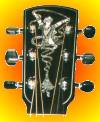I hope that you enjoy your foray into one
of my favorite topics.
I am neither a vintage guitar dealer nor a professional musician. My 25 years of guitar playing
have lifted me to the lofty status of mediocre amateur. Still, my lack of natural talent doesn't diminish
my enjoyment of the music these instrudments can makde in the hands of even a modestly talented player.
On the other hand, it also means that I would have difficulty trying to justify owning more than a couple of
these instruments. Someday, however - when I'm rolling in the dough - I plan to purchae a few more guitars.
Maybe by then my practicing will have overcome my lack of talent. This Web site, then, is dedicated
to some of the many instruments that I hope to own - and play - one day.
This Web site contains information and comments on guitars made by three manufacturers:

- FENDER®
- GIBSON®
- TERADA
Before buying a used guitar, especially for a significant sum of money, you should take a number of steps:
- Know the subject! With hundreds of manufacturers all around the world, this step a monumental task. Your best
course of action may be to concentrate on a few manufacturers or types of guitars. For example, concern yourself
primarily with Martin® guitars, or Gibson® acoustics, or Fender® electrics,
or classical guitars.
- If you're interested in the collectibility of the guitar, you need to know how the guitar was equipped when it
came from the factory. Since manufacturers make changes in the same model from year to year, you should have at
least one reference that you can check for accurate information. One of the best is Gruhn's Guide to Vintage Guitars,
which lists details regarding all kinds of guitars, although it does not cover every guitar made by every manufacturer.
Books about individual guitar companies are also available, and they provide company histories and have lots of pictures.
Some of the best of these books concern manufacturers such as Epiphone,® Martin,® Gibson,®
Ovation,® and Guild.®
- If you're buying the guitar in person, look it over very carefully. Some problems and defects are easy to spot,
such as cracks, missing tuners, necks pulling away from the body, and so on. Other problems and defects require closer
examination. Such problems include warping of the neck, bracing problems within the body, bad fretwork, and so on.
- Be familiar with the going price for the guitar you've got in mind. This can be tough to gauge, because prices vary
due to a number of factors. If a famous, popular guitarist plays a certain guitar, fans of that guitarist may very well
push up the price simply because they are trying to emulate him or her by buying the same guitar. It's a case of supply
and demand. Prices also vary from year to year, and even from region to region. Reference books that are well worth owning
are Blue Book of Acoustic Guitars (revised yearly), Blue Book of Electric Guitars (revised yearly), and The Official
Vintage Guitar Price Guide. In addition, some monthly publications also deal with vintage guitars. Look especially at
Vintage Guitar Magazine and Twentieth-Century Guitar. These magazines carry advertisements from dozens of vintage guitar
dealers from all around the United States, Europe, and even Japan. That information can help you gauge at least the price
range for a certain type of guitar. Of course, condition and originality are the primary determining factors for most
collectible guitars.
- Be aware that if you buy and sell guitars very much, sooner or later you are going to lose money on a deal.
The more you know, however, the less you'll lose. So be informed!
This guide is for anyone who has an interest in guitars, whether for playing, for collecting, or for both. When you read
advertisements for used or vintage guitars, you'll see a number of terms and abbreviations that are meaningful to the
knowledgeable buyer. Several of those abbreviations describe the guitar's condition. Unfortunately, not all sellers use
the same terminology (or even the same number of terms), and therefore universal agreement on these terms doesn't exist.
In addition, judging the condition of a guitar is quite subjective. Still, to provide some guidance, here are some terms
you are likely to see frequently. You also may see descriptions that add a + or - to one of these terms, indicating that
the condition is somewhere between two ratings. The description "Good +" means, for example, that the guitar is somewhere
between good condition and very good condition. If you buy a guitar via the Internet or mail order, and you haven't actually
seen or played the instrument, make sure that you buy from a reputable dealer whom you trust.
- New
- Brand new. These guitars come with a manufacturer's warranty and everything.
- Mint
- Perfect. A guitar in mint condition looks like it just came out of the box: no scratches, no wear.
- Near Mint
- The guitar looks almost new. Same as NM.
- Excellent
- A guitar in excellent condition may have a few minor signs of handling or use, such as minor scratches
that don't penetrate the finish. Same as EX, EC, EXC.
- Very Good
- A very "clean" guitar; that is, it shows some signs of use, such as a minor scratch or ding, but
otherwise it is in great shape. Same as VG, VGC.
- Good
- This guitar is also clean, but has more scratches and "bumps and bruises" than a very good guitar.
- Fair
- A fair guitar is quite playable, but has a significant number of dings, scratches, and wear.
- Poor
- A poor guitar shows a great deal of wear and has suffered an abundance of scratches and bumps;
it's playable, but maybe not as playable as you'd like, and it certainly isn't attractive.
Copyright 1999 by Greg Robertson
If you have enjoyed your visit, please
let others know about this website!
If you want to pass on any suggestions, words of praise, of - if you must -
complaints, please send email to
webmaster@myguitarcollection.com.




